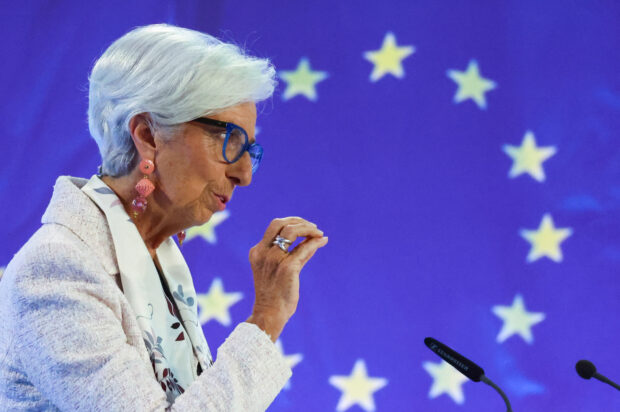
European Central Bank (ECB) President Christine Lagarde speaks to the media following the Governing Council’s monetary policy meeting at the ECB headquarters in Frankfurt, Germany, July 27, 2023. REUTERS/Kai Pfaffenbach
FRANKFURT -The European Central Bank hiked interest rates for the ninth consecutive time on Thursday, but raised the possibility of a pause in September as inflation pressures show tentative signs of easing and recession worries mount.
Fighting off a historic surge in prices, the ECB has now lifted borrowing costs by a combined 425 basis points since last July, worried that price growth could be perpetuated by both rising costs and wages in an exceptionally tight jobs market.
With Thursday’s 25-basis-point move, the ECB‘s deposit rate stands at 3.75 percent, its highest level since 2000 – before euro notes and coins were even in circulation. The main refinancing rate was set at 4.25 percent.
READ: ECB raises rates to 23-year high; keeps options open for September
ECB President Christine Lagarde ditched her practice of guiding markets for the next decision and said what would come next was in the balance, even if the central bank was determined to “break the back” of inflation.
She had responded to most of the questions at a press conference by saying all options remained on the table but sent the euro tumbling with a dovish flourish near the end.
“Do we have more ground to cover? At this point in time I wouldn’t say so,” Lagarde said, almost unprompted, while stressing that the ECB‘s decisions would depend on the data.
“There is the possibility of a hike (next time). There is the possibility of a pause. It’s a decisive maybe.” Lagarde said, adding that policymakers were “open-minded” and unified.
Ryan Djajasaputra at Investec said that Lagarde’s tone hinted at a pause. “Our main takeaway from today’s press conference was that it strengthened our existing view that this is the peak in rates“.
Two sources with direct knowledge of the discussion also described a shift in the mood on the Governing Council, with more policymakers than before now worried about a softening of the economy after a year in which concerns about inflation dominated.
Some policymakers currently favor a pause in September, expecting the euro zone to be heading into a recession, while others would prefer to raise borrowing costs again.
An ECB spokesperson declined to comment.
The ECB‘s earlier policy statement said rates would be set at “sufficiently restrictive levels for as long as necessary,” but dropped a reference to the rates having to be “brought” to a level that would cut inflation quickly enough to its 2 percent target.
Lagarde explained the tweak was “not random or irrelevant”.
Inflation, recession?
The problem is that inflation is coming down slowly and could take until 2025 to fall back to 2 percent, as a price surge initially driven by energy has seeped into the broader economy via large mark-ups and is fueling the cost of services.
READ: Euro zone inflation falls again in June as energy prices tumble
While overall inflation has halved from October, underlying price growth is hovering near historic highs and may have even accelerated this month.
Lagarde said the risks of so-called “second-round” effects had not worsened since last month.
But record-low unemployment has raised fears that wages will jump as workers seek to recoup real incomes lost to inflation, which is why many investors and analysts had been expecting the ECB to hike again in September pending autumn wage data.
“Because we expect a significant decline in inflation and a recession in the second half of the year, we continue to not forecast a rate hike in September. On the other hand, we doubt the market’s view that the ECB will cut rates as early as 2024,” said Joerg Kraemer, chief economist at Commerzbank.
The euro tumbled as Lagarde spoke and briefly dipped under $1.10, having risen 0.5 percent to touch $1.1149 beforehand.
Markets had fully priced in another rate hike just a few weeks ago, but few now see a move in September and markets only are pricing 17 basis points of hikes over the rest of the year.
“The bar for another hike in September is now dependent on upward surprises to inflation numbers, at a time when strong disinflationary forces are in play – so the default position is to keep rates constant for a sustained period,” said Neil Mehta, portfolio manager at RBC BlueBay Asset Management.
More tightening would, however, be consistent with comments from policymakers including ECB board member Isabel Schnabel that raising rates too far would be less costly than not enough.
On Wednesday, the U.S. Federal Reserve raised borrowing costs and kept the door open to more rate hikes, though Fed Chair Jerome Powell gave few hints about the September meeting.
Indicators of business, investor and consumer sentiment and bank lending surveys point to a continued deterioration after the euro zone skirted a recession last winter.
And with manufacturing in a deep recession and the previously resilient services sector showing signs of softening despite what is likely to be a superb summer holiday season, it is hard to see where any rebound would come from.
Such weakness, exacerbated by a loss of purchasing power after inflation eroded real incomes, could push inflation down faster than some expect, leaving less work for the ECB.
“We know we are getting closer,” Lagarde said, referring the end of the ECB‘s rate-hike run.